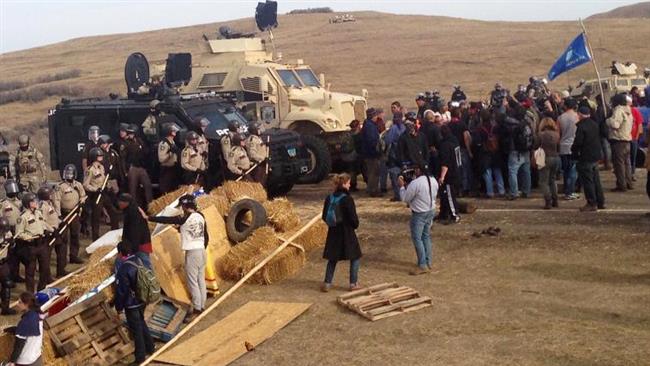Police arrest over 140 in crackdown on North Dakota oil pipeline protesters


More than 140 Native Americans and other protesters have been arrested by police in the US state of North Dakota in a tense standoff between law enforcement and demonstrators seeking to halt construction of a controversial oil pipeline.
At least 141 protesters were arrested on Thursday evening and Friday morning as officers attempt to clear a camp on private property in the path of the proposed $3.8 billion Dakota Access Pipeline, the Morton County Sheriff’s Department said in a statement.
Officers in riot helmets used pepper spray and shot beanbag rounds on some of the estimated 330 protesters as helicopters flew overhead.
Police blocked the highway leading to protest site with cars and burning tires, giving the scene a war zone-like appearance.
The protesters have been demonstrating for several months, and dozens have been arrested. Police expect additional protests, and possibly more arrests, in the coming days.

Native American protesters had occupied the property that crosses the pipeline’s path since Monday in an effort to stop Energy Transfer Partners’ construction of the Dakota Access Pipeline.
The pipeline has infuriated the Standing Rock Sioux Tribe and environmental activists who say it threatens the region’s water supply and sacred tribal sites. The tribe’s reservation is close to the pipeline’s route.
North Dakota Governor Jack Dalrymple said police were successful in clearing the camp. “Private property is not the place to carry out a peaceful protest,” he said.
Demonstrators, however, say they aren’t trespassing on private property, citing an 1851 treaty with the US government that says the land belongs to Native American tribes.
The Native American-led protest has grown into a larger movement in the United States, drawing in other tribes, environmentalists and advocates for Native Americans.
The federal government has twice asked the pipeline operator to voluntarily pause construction near the tribe’s reservation while the authorities reconsider the project’s route. But courts have refused to compel a halt.







